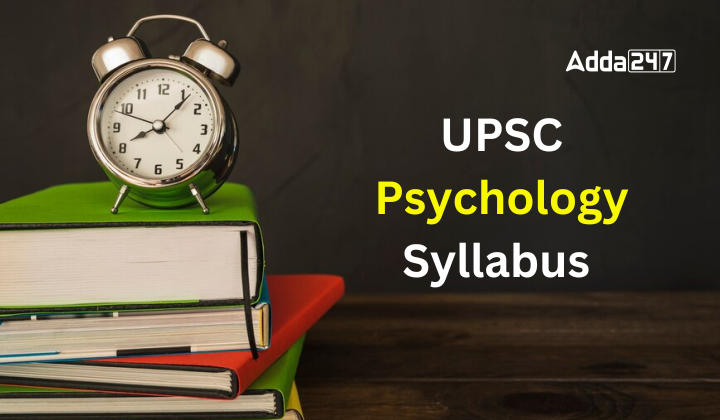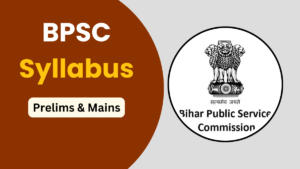Table of Contents
The UPSC Psychology Optional Paper is one of the most popular subjects chosen by candidates for the IAS Mains Exam. As part of the Mains examination, it holds significant weight, as it contributes to both the theoretical and practical understanding of psychology. The psychology syllabus is divided into two papers:.
Among the 48 optional subjects listed by UPSC for the IAS Mains Exam, Psychology is popular among students. It helps candidates understand psychology as a science and how to apply this knowledge to real-world problems. Below, we provide a detailed discussion of the Psychology Syllabus for the Mains exam.
UPSC Psychology Syllabus 2025
Opting for Psychology as an optional subject for the UPSC Mains exam is an excellent choice for candidates who are passionate about the field of human behavior, mental processes, and psychological theories. It offers a well-defined UPSC Psychology syllabus that can be mastered with the right resources and strategy. With a mix of theoretical and practical applications, this subject provides a unique approach to the UPSC exam, making it both interesting and scoring for aspirants.
| Aspect | Details |
| Exam Type | Civil Service Examination |
| Mode | Offline |
| Total Duration | 3 Hours |
| Total Papers | 2 Papers |
| Marks per Paper | 250 Marks |
| Total Marks | 500 Marks |
| Impact on Overall Score |
A strong performance in Psychology can significantly boost the overall score in the UPSC Mains exam
|
UPSC Psychology Syllabus 2025
Every year, the UPSC Commission releases the Psychology syllabus along with the UPSC Notification. There are two 250-mark papers in the psychology topic, for a total of 500 marks. There are two portions to each paper, and there are eight questions altogether. This post includes a downloadable PDF of the UPSC Psychology Optional Syllabus as well as the comprehensive syllabus for the optional subject, psychology.
UPSC Psychology Syllabus Paper I
Here is a Topic-wise UPSC Psychology Syllabus for Mains Optional Paper I, which provides a detailed breakdown of the key topics and sub-topics that candidates need to focus on during their preparation:
Foundations of Psychology
| Section |
Topics and Sub-Topics
|
| 1. Nature of Psychology |
– Definition, nature, and scope of psychology
|
|
– Branches of psychology (experimental, clinical, industrial, etc.)
|
|
| 2. Methods of Psychology |
– Experimental method, case study method, observation method, survey method
|
|
– Types of psychological tests (intelligence tests, personality tests, etc.)
|
|
| 3. Biological Basis of Behavior |
– Nervous system and its functions
– Brain structure and functions (forebrain, midbrain, hindbrain)
– Neurotransmitters and their role in behavior
– Endocrine system and its influence on behavior
|
| 4. Sensation, Attention, and Perception |
– Sensory processes (vision, hearing, taste, touch, smell)
– Theories of attention (broadbent’s theory, Treisman’s attenuation theory)
– Perception: Definitions, processes, and types (depth perception, figure-ground perception)
|
| 5. Learning |
– Theories of learning: Classical conditioning, operant conditioning, observational learning
– Types of learning (associative, non-associative learning)
|
| 6. Memory |
– Processes of memory (encoding, storage, retrieval)
– Types of memory (sensory, short-term, long-term)
– Forgetting and theories of forgetting (decay theory, interference theory)
|
| 7. Motivation and Emotion |
– Theories of motivation (drive theory, incentive theory, Maslow’s hierarchy of needs)
– Theories of emotion (James-Lange, Cannon-Bard, Schachter’s two-factor theory)
|
| 8. Intelligence |
– Theories of intelligence (Spearman’s g-factor, Thurstone’s primary mental abilities, Gardner’s multiple intelligences)
– Intelligence testing (Stanford-Binet, Wechsler scales, emotional intelligence)
|
| 9. Personality |
– Theories of personality (Freud’s psychoanalytic theory, Carl Rogers’ humanistic theory, Allport’s trait theory)
– Types of personality assessments (projective techniques, self-report inventories)
|
| 10. Psychological Disorders |
– Classification of mental disorders (DSM, ICD)
– Anxiety disorders, mood disorders, psychotic disorders, etc.
|
| 11. Therapeutic Approaches |
– Psychoanalytic therapy, behavior therapy, cognitive therapy, humanistic therapy
– Group therapy, family therapy, and modern approaches to treatment
|
UPSC Psychology Syllabus 2025 for Optional Paper II
Candidates can review the topic-wise UPSC Psychology Syllabus for Mains Optional Paper II here. Below in the table, we have provided the topics and sub-topics.
Psychology: Issues and applications
| Section | Topics and Sub-Topics |
| Psychological Measurement of Individual Differences |
The nature of individual differences; Characteristics and construction of standardized psychological tests; Types of psychological tests; Use, misuse, and limitations of psychological tests; Ethical issues in the use of psychological tests.
|
| Psychological Well-being and Mental Disorders |
Concept of health, ill health, positive health, well-being; Causal factors in mental disorders (anxiety disorders, mood disorders, schizophrenia and delusional disorders, personality disorders, substance abuse disorders); Factors influencing positive health and well-being; Lifestyle and quality of life; Happiness disposition.
|
| Therapeutic Approaches |
Psychodynamic therapies; Behaviour therapies; Client-centered therapy; Cognitive therapies; Indigenous therapies (Yoga, Meditation); Biofeedback therapy; Prevention and rehabilitation of the mentally ill; Fostering mental health.
|
| Work Psychology and Organisational Behaviour |
Personnel selection and training; Use of psychological tests in the industry; Training and human resource development; Theories of work motivation (Herzberg, Maslow, Adam Equity theory, Porter and Lawler, Vroom); Leadership and participatory management; Advertising and marketing; Stress and its management; Ergonomics; Consumer psychology; Managerial effectiveness; Transformational leadership; Sensitivity training; Power and politics in organizations.
|
| Application of Psychology to the Educational Field |
Psychological principles underlying the effective teaching-learning process; Learning styles; Gifted, retarded, learning disabled and their training; Training for improving memory and academic achievement; Personality development and value education; Educational, vocational guidance and career counselling; Use of psychological tests in educational institutions; Effective strategies in guidance programs.
|
| Community Psychology |
Definition and concept of community psychology; Use of small groups in social action; Arousing community consciousness and action for handling social problems; Group decision-making and leadership for social change; Effective strategies for social change.
|
| Rehabilitation Psychology |
Primary, secondary, and tertiary prevention programs—the role of psychologists; Organising services for the rehabilitation of physically, mentally, and socially challenged persons, including elderly persons; Rehabilitation of persons suffering from substance abuse, juvenile delinquency, and criminal behaviours; Rehabilitation of victims of violence; Rehabilitation of HIV/AIDS victims; The role of social agencies.
|
| Application of Psychology to Disadvantaged Groups |
The concepts of disadvantaged and deprivation; Social, physical, cultural, and economic consequences of disadvantaged and deprived groups; Educating and motivating the disadvantaged towards development; Relative and prolonged deprivation.
|
| Psychological Problems of Social Integration |
The concept of social integration; The problem of caste, class, religion, and language conflicts and prejudice; Nature and the manifestation of prejudice between the ingroup and outgroup; Causal factors of such conflicts and prejudices; Psychological strategies for handling conflicts and prejudices; Measures to achieve social integration.
|
| Application of Psychology in IT and Mass Media |
The present scenario of Information Technology and the mass media boom and the role of psychologists; Selection and training of psychology professionals to work in the field of IT and mass media; Distance learning through IT and mass media; Entrepreneurship through e-commerce; Multilevel marketing; Impact of TV and fostering value through IT and mass media; Psychological consequences of recent developments in Information Technology.
|
| Psychology and Economic Development |
Achievement motivation and economic development; Characteristics of entrepreneurial behaviour; Motivating and training people for entrepreneurship and economic development; Consumer rights and consumer awareness; Government policies for the promotion of entrepreneurship among youth, including women entrepreneurs.
|
| Application of Psychology to Environment |
Environmental psychology: effects of noise, pollution, and crowding; Population psychology: psychological consequences of population explosion and high population density; Motivating for small family norms; Impact of rapid scientific and technological growth on degradation of the environment.
|
| Application of Psychology in Other Fields |
a) Military Psychology: Devising psychological tests for defence personnel for use in selection, training, and counselling; Training psychologists to work with defence personnel in promoting positive health; Human engineering in defence. b) Sports Psychology: Psychological interventions in improving the performance of athletes and sports participants in individual and team games. c) Media: Influences on pro and anti-social behaviour. d) Terrorism: Psychology of terrorism.
|
| Psychology of Gender |
Issues of discrimination; Management of diversity; Glass ceiling effect; Self-fulfilling prophecy; Women and Indian society.
|
UPSC Psychology Syllabus 2025 Download PDF
Candidates who are appearing in the UPSC Psychology mains Exam can download the UPSC Psychology Syllabus PDF Here. Click on the link below to Download the UPSC Psychology Syllabus 2025.
Download UPSC Psychology Syllabus 2025 PDF
UPSC Psychology Syllabus Preparation Tips
Candidates can check some of the preparation resources added to you like using books and newspapers. You can use online resources through different web portals and platforms. Solve UPSC previous year’s questions to build a strong understanding of these topics.
- Read NCERT Books
- Focus on Key Concepts
- Practice Answer Writing
- Analyze Previous Years’ Papers
- Create a Study Plan
- Current Affairs
Note that consistency, discipline, and a thorough understanding of concepts are key to success in the UPSC Mains Psychology examination. Good luck with your preparation.
| UPSC Mains Optional Papers Related Articles | |
| UPSC History Syllabus | UPSC Public Administration Syllabus |
| UPSC Chemistry Syllabus | UPSC Economics Syllabus |
| UPSC Geography Syllabus | UPSC Polity Syllabus |
| UPSC Physics Syllabus | UPSC Botany Syllabus |



 APSC Syllabus 2025, Download Prelims And...
APSC Syllabus 2025, Download Prelims And...
 Punjab PCS Syllabus 2025, New Prelims an...
Punjab PCS Syllabus 2025, New Prelims an...
 BPSC Syllabus 2025 and Exam Pattern For ...
BPSC Syllabus 2025 and Exam Pattern For ...




